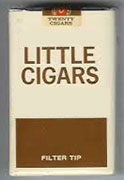- Recognizing the Signs of Hypothyroidism
- 10 Strategies to Overcome Insomnia
- Could Artificial Sweeteners Be Aging the Brain Faster?
- Techniques for Soothing Your Nervous System
- Does the Water in Your House Smell Funny? Here’s Why
- Can a Daily Dose of Apple Cider Vinegar Actually Aid Weight Loss?
- 6 Health Beverages That Can Actually Spike Your Blood Sugar
- Treatment Options for Social Anxiety Disorder
- Understanding the Connection Between Anxiety and Depression
- How Daily Prunes Can Influence Cholesterol and Inflammation
Flavored Cigars Gaining in Popularity With U.S. Kids: CDC


TUESDAY, Oct. 22More than two of every five teen smokers use flavored little cigars or cigarettes, according to a new report from U.S. health officials.
Regulators are concerned that these flavors, which mask the harshness of tobacco with tastes of candy or fruit, obscure the health risks of smoking and help draw young people into lifelong tobacco addiction.
Although the sale of most flavored cigarettes is banned in the United States, tobacco manufacturers have worked around the ban by producing these little cigars, which weigh slightly more than cigarettes and so avoid regulation.
Young smokers who use flavored little cigars are less likely to consider quitting tobacco use, researchers at the U.S. Centers for Disease Control and Prevention (CDC) found. Nearly 60 percent of those smoking flavored cigars are not thinking about quitting, compared with about 49 percent of all other cigar smokers.
“Flavored or not, cigars cause cancer, heart disease, lung disease and many other health problems. Flavored little cigars appeal to youth and the use of these tobacco products may lead to disfigurement, disability and premature death,” CDC director Dr. Tom Frieden said in an agency news release. “We need to take comprehensive steps to reduce all tobacco use for all of our youth.”
The study, based on data from a 2011 national survey on tobacco use, is the first to measure how many American youth are using flavored little cigars and cigarettes. The findings were published online Oct. 22 in the Journal of Adolescent Health.
Congress in 2009 prohibited the use of flavors, except menthol, in cigarettes with the passage of the Family Smoking Prevention and Tobacco Control Act.
However, flavored little cigars are still manufactured and sold with candy and fruit flavorings. They’ve also come to closely resemble cigarettes in their sizes, shapes, filters and packaging. The U.S. Food and Drug Administration currently does not regulate cigars.
“Many little cigars bear a remarkable resemblance to cigarettes. In fact, some youth who are smoking cigarettes may be smoking flavored little cigars that they’ve mistaken for cigarettes,” said Dr. Tim McAfee, director of the CDC’s Office on Smoking and Health. “The concern it raises for us is because little cigars are so similar to cigarettes, this represents a loophole in the FDA’s ban on flavored cigarettes.”
Little cigars have become more popular in recent years, the CDC reported. Sales increased 240 percent from 1997 to 2007, with flavored brands making up almost 80 percent of the market share.
In response to the CDC findings, the American Lung Association released a statement denouncing fruit- and candy-flavored tobacco products as “a mainstay in the Big Tobacco playbook to addict kids and create lifelong tobacco users.”
“This study shows that the tobacco industry will not quit its efforts to addict kids. I can’t emphasize enough the importance of robust regulatory oversight of cigars and all tobacco products by FDA,” Paul Billings, senior vice president of advocacy and education for the American Lung Association, said in the statement. “We need the Obama administration to take common-sense steps to eliminate the sale and marketing of flavored cigars and little cigars, as well as other flavored tobacco products.”
The national tobacco survey involved nearly 19,000 students in grades six through 12 from 178 schools.
“The findings indicate that a considerable proportion of U.S. middle and high school students who smoke tobacco report using flavored little cigars or flavored cigarettes,” the researchers wrote.
Overall, about 8 percent of the young people in the survey admitted to smoking cigars, while nearly 11 percent said they smoke cigarettes.
About 36 percent of young cigar smokers reported using flavored little cigars, while 35 percent of young cigarette smokers reported using flavored cigarettes.
About 42 percent of all young smokers reported use of either flavored little cigars or cigarettes. Whites, boys and high school students in particular were more likely to use flavored little cigars or cigarettes.
Flavored little cigars have other traits that can make them more appealing to young people, McAfee said.
Many states tax cigars at a lower rate than cigarettes, and in many jurisdictions they aren’t required to be sold in packs and can be sold in singles or doubles. “This makes it more accessible financially for kids,” he said.
Little cigars aren’t the only way that the tobacco industry is using flavors to entice young smokers, the American Lung Association noted.
The CDC in September published a report that e-cigarette (electronic cigarette) use among young smokers has doubled, due in part to brands that come in flavors such as bubble gum, gummy bear, orange cream soda and cotton candy.
More information
For more about tobacco use among young people, visit the U.S. Centers for Disease Control and Prevention.
Source: HealthDay
Copyright © 2026 HealthDay. All rights reserved.










